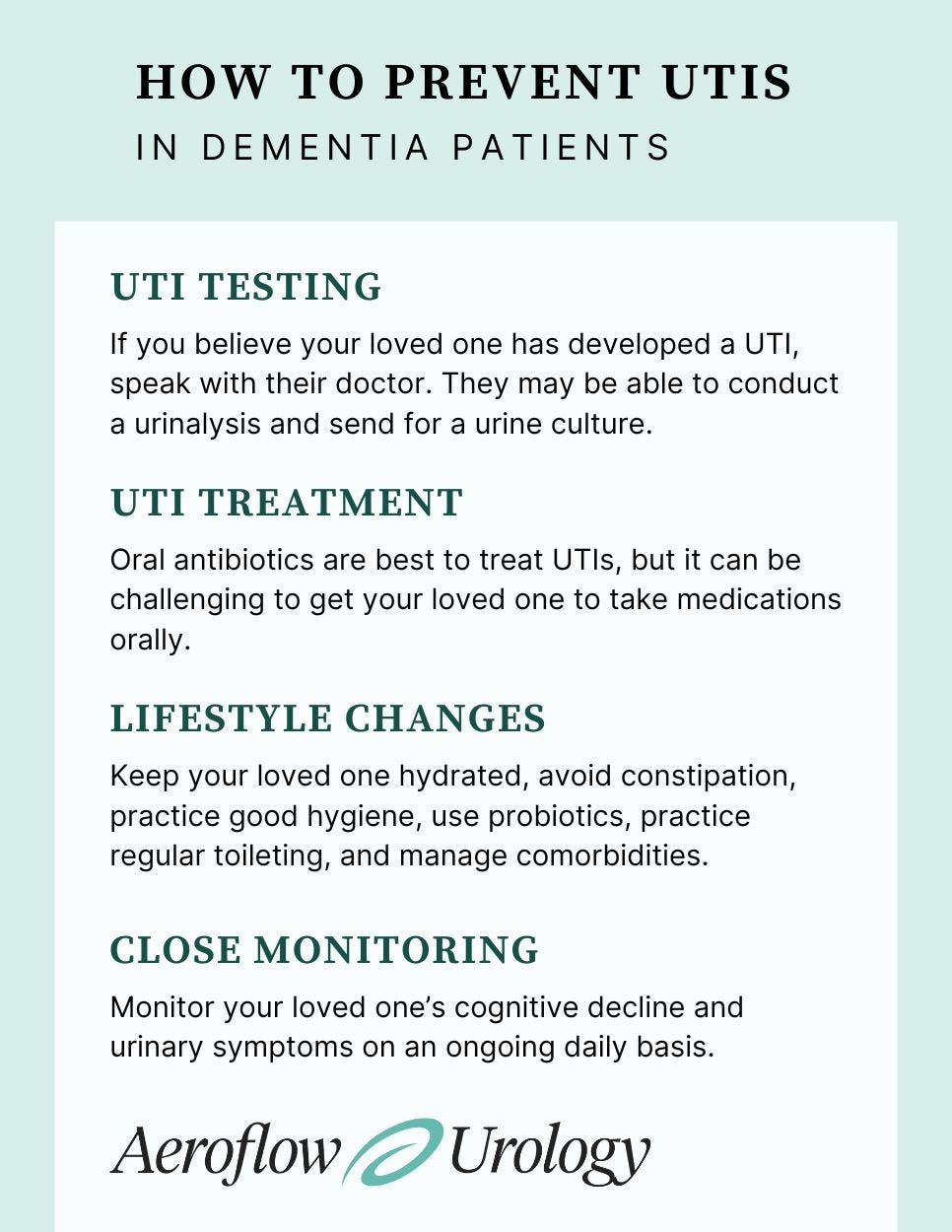Key Takeaways:
- Dementia patients are highly susceptible to UTIs due to cognitive and physical impairments, making early detection and diagnosis difficult.
- Effective prevention of UTIs in dementia patients requires consistent hydration, hygiene, regular toileting, and vigilant monitoring of symptoms.
- Untreated UTIs can lead to severe complications like cognitive decline and sepsis, necessitating timely antibiotic treatment and preventive care.
Urinary tract infections (UTIs) are a common but serious concern for older adults, particularly those with dementia.
As the immune system weakens with age, recognizing and responding to the early signs of a UTI becomes increasingly challenging.


Cognitive impairments in dementia patients further complicate the detection and treatment of these infections.
This blog explores why dementia patients are at a higher risk for developing UTIs, the unique challenges they face, and practical strategies for caregivers to prevent and manage UTIs effectively.
Why Are Dementia Patients at Risk for Developing UTIs?
Symptoms of UTIs In Dementia Patients
How Can Caregivers Detect a UTI In a Dementia Patient?
How to Prevent UTIs In Dementia Patients
Dementia Resources for Caregivers
How to Receive Free Incontinence Supplies for Your Loved One
INCONTINENCE PRODUCTS THROUGH INSURANCE:
Aeroflow Urology is in-network with many Medicaid and Medicaid-managed insurance plans and is accredited by Medicaid. Complete our Eligibility Form, and we’ll automatically check to see if your plan covers incontinence supplies. ***Must meet certain requirements to qualify.***
You will also receive the care and attention every person managing incontinence deserves: A personalized list of 100% insurance-covered incontinence supplies, a dedicated Continence Care Specialist you can contact during business hours, a user-friendly online portal for easy monthly reordering, and educational content.
Get the continence care you need with the dignity you deserve. Join the Aeroflow Urology family today! It only takes 5 minutes to get started.
Check Your Eligibility
In Under 2 Minutes
Discover the adult incontinence products available through your insurance.
Why Are Dementia Patients at Risk for Developing UTIs?
UTIs occur when bacteria enter the urethra and cause an infection of any part of the urinary system. After the age of 35, the immune system begins to weaken, and the warning signs of an infection dwindle, making it more difficult to notice UTI symptoms.
Older people with dementia are not able to understand or recognize their UTI symptoms, and age brings decreased immune system signs / symptoms, leading to twice the risk of not recognizing a UTI when it’s first developing.
Older individuals, particularly those with dementia, are at a higher risk of developing UTIs for a few reasons. Risk factors include:
Cognitive Impairments
Those with dementia have difficulty recognizing symptoms of a UTI, which can delay diagnosis and treatment. Forgetting to hydrate, forgetting to urinate, incontinence, and difficulty with personal hygiene may occur in people with dementia.
Physical Limitations
Immobility or reduced mobility can limit the ability to ambulate to the bathroom, and weakened immune systems can make it difficult to fight off UTI infections.
Behavioral Concerns
People with dementia can resist assistance with toileting and personal hygiene. Also, prolonged use of incontinence products creates a warm, moist environment, the perfect breeding ground for bacteria growth, raising the risk of UTIs.
Medical Factors
Typically, individuals with dementia have other comorbidities (diabetes, CHF, renal disease, etc.) that can increase the risk of UTIs. Medications (especially anticholinergics) cause more confusion and can contribute to increased UTIs.
Environmental Issues
Most patients with dementia live in long-term care facilities or nursing homes, and increasing their UTI risk secondary to bacteriuria is short staffing, which can mean decreased incontinence product or catheter changes, or hygiene issues.
Symptoms of UTIs In Dementia Patients
The typical symptoms of a UTI include:
- Burning sensation or pain when urinating.
- Feeling a strong and sudden urge to urinate frequently.
- Needing to urinate more often than usual, especially at night.
- Urine color that’s cloudy, bloody, red, pink, brown, or has a strong odor.
- Pain in the lower abdomen or back.
- Fever, nausea, vomiting, chills.
However, in older adults with dementia, symptoms can be atypical. This is because symptoms don’t occur until the very last moment since some warning signs are more present in younger and cognitively intact individuals. Symptoms for those that have dementia could include:
- Mental health and cognitive changes.
- Agitation and aggression.
- Restfulness
- Hallucinations
- Delirium / delusions.
- Disorientation
- Loss of appetite.
- Fatigue
- Generalized weakness.
- Sleep disturbances.


How Can Caregivers Detect a UTI In a Dementia Patient?
Sudden changes in mental health and decline in cognition are some of the first warning signs of UTIs in older adults and individuals with dementia. Mental and cognitive changes can make it difficult to determine between a UTI and worsening dementia, so caregivers must pay attention to the signs their loved one is exhibiting.
If your loved one is showing signs of increased confusion, delirium, agitation, hallucinations, lethargy, loss of appetite, or sudden worsening of incontinence symptoms, they may have a UTI.
It may be challenging to diagnose a UTI due to limited verbal and cognitive function in your loved one, making it difficult to discuss any symptoms. Aggressiveness could also make testing for a UTI or obtaining a urine specimen difficult.
How to Prevent UTIs In Dementia Patients
UTI Testing
If you believe your loved one has developed a UTI, speak with their healthcare professional or specialist, such as a urologist. Their provider may be able to conduct a urinalysis and send for a urine culture.
However, a urinalysis can sometimes be difficult to correctly diagnose a UTI, as people in long-term nursing facilities often have the presence of bacteria in the urine, with or without symptoms. Catching a urine specimen may also be problematic if your loved one has incontinence.
UTI Treatment
Treating a UTI is only necessary when a urine culture is positive and UTI symptoms are present. Oral antibiotics would be the best route. However, it can be challenging to get dementia patients to take them orally. Oral antibiotic resistance can also occur, so getting them intramuscularly or intravenously can be difficult.
Lifestyle Changes
Lifestyle changes for UTIs in dementia patients include hydration, avoiding constipation, ambulation, practicing good hygiene, using probiotics, regular toileting, and managing comorbidities.
Close Monitoring
Monitor your loved one’s cognitive decline and urinary symptoms on an ongoing daily basis. Keep hydration levels up, and use appropriate staffing for hygiene and toileting habits when applicable. You can also apply local hormone creams to vulva owners, implement regular changes of incontinence products, and manage comorbidities.
The keys to preventing UTIs in your loved one are consistency and getting the cooperation of your loved one.
Leaving UTIs untreated can lead to a worsening decline of cognitive function, increased risk for hallucinations, delirium, delusions, pyelonephritis, and increased risk of sepsis, bladder damage, kidney damage, and even death.
Complicated UTIs require IV antibiotics, and hospitalization should be pursued at that time. Individuals with complicated UTIs are at risk for sepsis, septic shock, and pyelonephritis. Hospitalization may also occur if the patient is not improving with oral antibiotics and needs to switch to IV antibiotics.
Dementia Resources for Caregivers
One of the best resources caregivers and family members can use when caring for a loved one with dementia is Aeroflow Urology. Dementia and incontinence are closely linked because many individuals with dementia develop bladder and bowel control conditions. When this happens, your loved one will require incontinence products, such as adult briefs, adult pull-ons, or bladder control pads. These can be costly out of pocket, but your loved one may be able to get them for free through their insurance plan with us!
We provide medical-grade adult incontinence supplies to those who have been diagnosed with an underlying condition, such as Alzheimer’s disease and incontinence. We ship products for free every month in the mail in discreet packaging and make refilling your loved one’s supplies simple with our online reordering portal.
All you need to do to get started is fill out our 2-minute Eligibility Form with your loved one’s insurance information and some personal information. We’ll contact you within 1-2 business days via email and text informing you of your loved one’s eligibility.

From there, you’ll need to provide us with a prescription for incontinence products, and you’ll be sent a personalized list of incontinence supplies to choose from that are 100% covered by their insurance!
Speaking to your local hospital can also be helpful when caring for someone with dementia, and you can also use local or regional support groups and other resources in the community. Aside from these resources, you may use:
The range of cognitive, physical, social, environmental, and emotional concerns associated with dementia can make prevention and treatment of UTIs in those with dementia difficult. You need all hands on deck to optimize treatment modalities for the best care!
Disclaimer
Information provided on the Aeroflow Urology blog is not intended as a substitute for medical advice or care from a healthcare professional. Aeroflow recommends consulting your healthcare provider if you are experiencing medical issues relating to incontinence.













